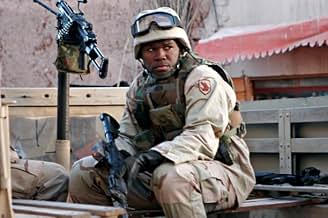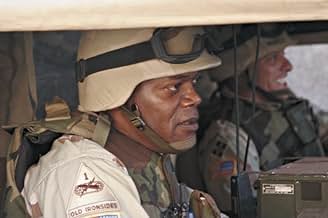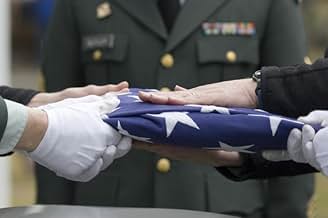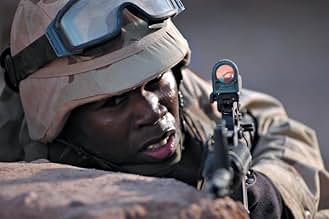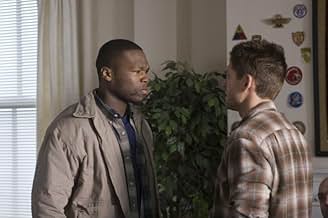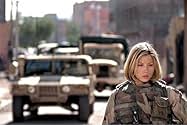ÉVALUATION IMDb
5,6/10
12 k
MA NOTE
Ajouter une intrigue dans votre langueThree soldiers struggle to readjust to life at home after returning home from a lengthy tour in Iraq.Three soldiers struggle to readjust to life at home after returning home from a lengthy tour in Iraq.Three soldiers struggle to readjust to life at home after returning home from a lengthy tour in Iraq.
- Prix
- 4 nominations au total
50 Cent
- Jamal Aiken
- (as Curtis Jackson)
Jeffrey Nordling
- Cary
- (as Jeff Nordling)
Avis en vedette
The War Inside, November 6, 2007 By Grady Harp (Los Angeles, CA United States) - See all my reviews (TOP 10 REVIEWER) (REAL NAME) HOME OF THE BRAVE is one of those films that is difficult to critique: the message of how war permanently alters the minds and bodies of soldiers and their families is a meaningful one and one about which we need to be reminded. Irwin Winkler has made some good films (DeLovely, Life as a House, Guilty by Suspicion), but in this film he seems to be working against the script by Mark Friedman which has a tendency to oversimplify emotions and thus loses its impact.
The film begins in Iraq where each of the main characters is at least tangentially connected. Dr. Will Marsh (Samuel L. Jackson) is in a truck driven by Vanessa (Jessica Biel) and accompanied by soldiers Tommy (Brian Presley) and Jamal (50 Cent AKA Curtis Jackson) when a roadside bomb explodes, maiming the hand of Vanessa, killing Tommy's best friend, making Jamal witness unnecessary civilian deaths, and placing Will in an impotent position as a doctor. Flash forward to Spokane, Washington where each of these four wounded people try to piece their lives together in a world that loathes the Iraq war (not at all unlike the treatment of soldiers returning from the unpopular Vietnam debacle), trying to make sense of it all.
The problem with the good idea for a movie lies in the too traditional plot lines. The actors (especially Presley and Biel) give it their all, but credibility enters and the smoke rises and we are left with a misplaced patriotism. The message is strong: the delivery of it is shaky. Grady Harp
The film begins in Iraq where each of the main characters is at least tangentially connected. Dr. Will Marsh (Samuel L. Jackson) is in a truck driven by Vanessa (Jessica Biel) and accompanied by soldiers Tommy (Brian Presley) and Jamal (50 Cent AKA Curtis Jackson) when a roadside bomb explodes, maiming the hand of Vanessa, killing Tommy's best friend, making Jamal witness unnecessary civilian deaths, and placing Will in an impotent position as a doctor. Flash forward to Spokane, Washington where each of these four wounded people try to piece their lives together in a world that loathes the Iraq war (not at all unlike the treatment of soldiers returning from the unpopular Vietnam debacle), trying to make sense of it all.
The problem with the good idea for a movie lies in the too traditional plot lines. The actors (especially Presley and Biel) give it their all, but credibility enters and the smoke rises and we are left with a misplaced patriotism. The message is strong: the delivery of it is shaky. Grady Harp
A better title would be "Home of the Made-for-TV Movie"--You'd have to be from the "home of the brave film critics" to sit trough this laundry list of post-traumatic syndrome clichés. Three Iraq veterans return to face a civilian world that doesn't understand and personal demons that won't let them forget the ungodly carnage they lived through. But nothing is new or unique, no dialogue is incisive, no action is memorable.
The film does remind us about how unfair the whole Iraq invasion is to the soldier, who not only must suffer the damages to limb, life, and psyche but must also face a hostile electorate which carries little of the respect and patriotism that welcomed soldiers back from WWII. In this way, director Irwin Winkler achieved a success: He catalogued the suffering of the returning soldier, be he a surgeon experiencing the horror of failure to heal or a female grunt losing a hand and learning to live with the clumsiness.
A work of art should be unique in some way, often in its vision of its subject. Home of the Brave says nothing new to a populace awaiting insights into a war that still makes no sense. In that regard both fictional soldiers and real audiences remain largely clueless about the Iraq dilemma. Perhaps President Bush could helpI don't think so.
The film does remind us about how unfair the whole Iraq invasion is to the soldier, who not only must suffer the damages to limb, life, and psyche but must also face a hostile electorate which carries little of the respect and patriotism that welcomed soldiers back from WWII. In this way, director Irwin Winkler achieved a success: He catalogued the suffering of the returning soldier, be he a surgeon experiencing the horror of failure to heal or a female grunt losing a hand and learning to live with the clumsiness.
A work of art should be unique in some way, often in its vision of its subject. Home of the Brave says nothing new to a populace awaiting insights into a war that still makes no sense. In that regard both fictional soldiers and real audiences remain largely clueless about the Iraq dilemma. Perhaps President Bush could helpI don't think so.
Sincerity oozes from every scene of The Home of the Brave, but it can't disguise a rather routine story that has been told many times before. Essentially an updating of The Best Years of Our Lives, the film follows the trials of three veterans of the Iraqi occupation as they struggle to adjust to life back in civvy street. Jennifer Beils returns home minus her hand, Brian Presley is haunted by witnessing the death of his childhood friend while on duty, and surgeon Samuel L. Jackson is guilt-stricken by the lack of emotion he felt when he failed to save the wounded soldiers on his operating table. Like Harold Russell, Biels struggles to come to terms with the loss of her hand (although the hook has been replaced by a chunky looking prosthetic), which costs her a relationship, and like Dana Andrews, Brian Presley returns home to find his job has been given to someone else and finds employment in a low-paid job (ticket clerk at a multiplex instead of Andrews' soda jerk). In easily the least convincing storyline, Jackson seeks refuge from his feelings in alcohol.
The film's script can best be described as prosaic, with a couple of high-points standing out from the alarming reliance on familiar phrases and sentiments. The scene in the vice-principal's office is well played, and there are a couple of insightful moments, but everything looks too familiar, as if the film has been cobbled together as a kind of homage to the best of previous 'coming home' movies.
While no one questions the bravery and dedication of the troops from all countries in places like Afghanistan and Iraq – and there is no suggestion that this film is anything other than a genuine attempt by the makers to depict how it feels to find yourself a stranger in your own land with emotions you can't control or understand – you can't really hope to create a successful film if you're not prepared to allow it to embrace the bigger picture. I wonder how many people return from these places feeling betrayed by their leaders, and that they've been used by their country for reasons other than altruistic. The idea that the war in Iraq is about America's need for oil, and the questions arising from the States' heavy involvement on the world stage and the perception such an involvement gives rise to amongst its own population and people around the world, is only briefly alluded to – and even then by a troubled juvenile who is ostensibly rebelling against his parents.
The film's script can best be described as prosaic, with a couple of high-points standing out from the alarming reliance on familiar phrases and sentiments. The scene in the vice-principal's office is well played, and there are a couple of insightful moments, but everything looks too familiar, as if the film has been cobbled together as a kind of homage to the best of previous 'coming home' movies.
While no one questions the bravery and dedication of the troops from all countries in places like Afghanistan and Iraq – and there is no suggestion that this film is anything other than a genuine attempt by the makers to depict how it feels to find yourself a stranger in your own land with emotions you can't control or understand – you can't really hope to create a successful film if you're not prepared to allow it to embrace the bigger picture. I wonder how many people return from these places feeling betrayed by their leaders, and that they've been used by their country for reasons other than altruistic. The idea that the war in Iraq is about America's need for oil, and the questions arising from the States' heavy involvement on the world stage and the perception such an involvement gives rise to amongst its own population and people around the world, is only briefly alluded to – and even then by a troubled juvenile who is ostensibly rebelling against his parents.
After getting notice that they're soon going home, an American unit gets ambushed in Iraq. Will Marsh (Samuel L. Jackson) leads the drivers. Single mom Vanessa Price (Jessica Biel) survives a blast but loses her hand. Tommy Yates (Brian Presley) holds his dying best friend Owens in his arms. Jamal Aiken (50 Cent) gets hurts tripping over some bricks. They return to Spokane. Surgeon Marsh is dealing PTSD and his anti-war son Billy. Yates loses his job. Price deals with her hand and angry Aiken is haunted by killing a civilian.
The opening action scenes contain both the good and the bad of this movie. It does some compelling action. It's got good intensity. Then this ends in one of the most old-fashion melodramatic overwrought-music cry-holding-dying-buddy scene possible. That is the pull-push of this movie. It is sincere in its portrayal of the home front but it is also very on-the-nose. It's got good intentions. Everybody is acting well. It does need to pull back the melodrama.
The opening action scenes contain both the good and the bad of this movie. It does some compelling action. It's got good intensity. Then this ends in one of the most old-fashion melodramatic overwrought-music cry-holding-dying-buddy scene possible. That is the pull-push of this movie. It is sincere in its portrayal of the home front but it is also very on-the-nose. It's got good intentions. Everybody is acting well. It does need to pull back the melodrama.
This film is about how soldiers who served in Iraq face life back in their hometown.
The striking thing is that this film focuses on the emotional impact on the returning soldiers, and the people around them. The dialogs are raw, truthful and at times politically provocative. The portrayal of post traumatic stress disorder is subtle but palpable, and Jessica Biel's performance of a tough woman to hide her pains of losing her hand is astonishingly well acted.
I do not see this as an anti-war vehicle. Rather, it serves as a reminder of how wars affect the soldiers, and then make us think hard whether such a war was necessary in the first place. I am the most impressed by the filmmakers decision on making this movie, as the predominant climate in America is against them.
The striking thing is that this film focuses on the emotional impact on the returning soldiers, and the people around them. The dialogs are raw, truthful and at times politically provocative. The portrayal of post traumatic stress disorder is subtle but palpable, and Jessica Biel's performance of a tough woman to hide her pains of losing her hand is astonishingly well acted.
I do not see this as an anti-war vehicle. Rather, it serves as a reminder of how wars affect the soldiers, and then make us think hard whether such a war was necessary in the first place. I am the most impressed by the filmmakers decision on making this movie, as the predominant climate in America is against them.
Le saviez-vous
- AnecdotesSamuel L. Jackson and Christina Ricci appeared in Black Snake Moan (2006).
- GaffesWhen one soldier is told to fire the AT-4 at a gunman on the roof, he is holding it backwards when he is firing it. The rocket comes out of the smaller end of the tube, not the larger.
- Citations
Will Marsh: Buck Fush? Buck you, you son of a bitch.
- Bandes originalesTry Not to Remember
Written and Performed by Sheryl Crow
Produced by Stephen Endelman
Warner-Tamerlane Publishing Corp. (BMI)/Old Crow Music (BMI)
(All rights adnimistered by Warner-Tamerlane Publishing Corp.)
Courtesy of A&M Records
Meilleurs choix
Connectez-vous pour évaluer et surveiller les recommandations personnalisées
- How long is Home of the Brave?Propulsé par Alexa
Détails
- Date de sortie
- Pays d’origine
- Sites officiels
- Langues
- Aussi connu sous le nom de
- Home of the Brave
- Lieux de tournage
- sociétés de production
- Consultez plus de crédits d'entreprise sur IMDbPro
Box-office
- Budget
- 12 000 000 $ US (estimation)
- Brut – États-Unis et Canada
- 51 708 $ US
- Fin de semaine d'ouverture – États-Unis et Canada
- 6 000 $ US
- 17 déc. 2006
- Brut – à l'échelle mondiale
- 499 620 $ US
- Durée
- 1h 46m(106 min)
- Couleur
- Mixage
- Rapport de forme
- 2.35 : 1
Contribuer à cette page
Suggérer une modification ou ajouter du contenu manquant


